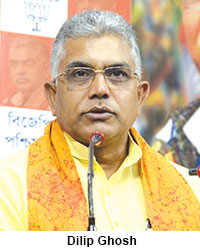The third National Education Policy (NEP) 2020 approved by the Union Cabinet headed by prime minister Narendra Modi after four years of preparation on July 29, replacing the 34-year-old National Policy on Education legislated in 1986 by prime minister Rajiv Gandhi, has elicited mixed reactions across the country.
In West Bengal (pop. 91 million), the policy has been greeted with a volley of protests. The main grievance is that the policy was formulated without state representatives being taken into confidence. West Bengal’s education minister Partha Chatterjee describes it as a “copy paste of a western model”. Addressing the media on July 31, he said: “Education is on the concurrent list, but the content of the new policy was not discussed with state governments before it was passed by the Union Cabinet.”
In the same vein, chief minister and Trinamool Congress supremo Mamata Banerjee, now in her second term and in campaign mode for the legislative assembly election scheduled for next summer, awarded NEP a mere 10-12 percent score.
 Reacting, Dilip Ghosh, president of BJP, the main opposition party in the state says: “It is an irony that the state government, which has no education policy, is opposing the education policy of the Central government. The education system in Bengal is completely broken.”
Reacting, Dilip Ghosh, president of BJP, the main opposition party in the state says: “It is an irony that the state government, which has no education policy, is opposing the education policy of the Central government. The education system in Bengal is completely broken.”
Although NEP 2020 has been widely acclaimed countrywide as revolutionary and path-breaking, several academics in the state are of the opinion that NEP 2020 excessively centralises higher education. “Segregation of universities into teaching and research institutions goes against the very idea of a university, in which research and teaching have to be coterminous,” says Sankhayan Choudhury, general secretary of Calcutta University Teachers’ Association
New York-based educationist and human rights activist Dr. Partha Banerjee, who frequently visits Bengal and closely follows political developments here, is more direct in his criticism of NEP 2020. “It is a charter for an authoritarian, ultranationalistic agenda. The policy is dangerous because it totally rejects India’s cultural and historical diversity and enforces conformity. It will brainwash children into believing India is a unified, centrally governed country. Although there is insufficient attention to the language issue, I discern a clear intent to impose Hindi and Hinduism on the country. This is clearly an RSS dictated policy,” says Banerjee
Adds Sabyasachi Basu Ray Chaudhury, vice chancellor of Rabindra Bharati University: “NEP 2020 paves the way for centralising the entire higher education system. It has erased the UGC model curriculum, which gave universities a free hand to alter 20 percent of the syllabus to include local content in the interests of diversity.”
The state’s intelligentsia and academics apart, West Bengal’s powerful students unions are also dissatisfied with NEP 2020. On July 31, the Students’ Federation of India (SFI) described the new policy as “anti-student”. It has held demonstrations across the state to demand withdrawal of the NEP and was busy collecting its targeted 100,000 protest letters to be sent to the Union education ministry by August 15.
However, it’s pertinent to note that SFI is the student wing of the CPM (Communist Party of IndiaMarxist). Despite the utter rout of the CPM and allied parties in the legislative assembly elections of 2011 and 2015, SFI has retained its popularity in West Bengal’s premier universities, including the state’s showpiece Jadavpur and Presidency universities. In the circumstances the state’s radicalised students offer the only hope of the CPM returning to power in West Bengal
Meanwhile, the BJP has emerged as West Bengal’s premier opposition party wing after winning 18 of Bengal’s 42 Lok Sabha seats in General Election 2019, restricting TMC to 22 (cf. 34 in 2014). In recent years, Banerjee has been mending fences with Kolkata’s influential bhadralok (cultured middle class) by placing education high on her reforms agenda.
The calculation is that given the premium that the middle class places on high-quality education, bhadralok will back TMC rather than the BJP whose ministers at the Centre have acquired a notorious reputation for harping on the glories of ancient India, rather than on addressing the more pressing economic issues, especially unemployment, spreading across the country.
Baishali Mukherjee (Kolkata)
Also read: West Bengal: Brightening horizon – Private schools
Posted in Education News


























